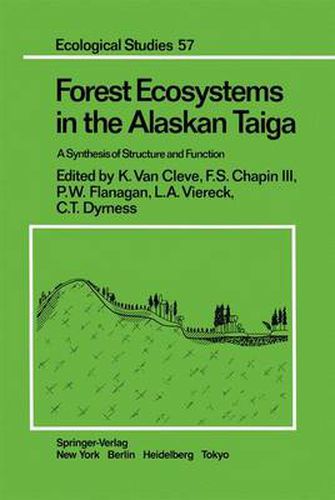Readings Newsletter
Become a Readings Member to make your shopping experience even easier.
Sign in or sign up for free!
You’re not far away from qualifying for FREE standard shipping within Australia
You’ve qualified for FREE standard shipping within Australia
The cart is loading…






This title is printed to order. This book may have been self-published. If so, we cannot guarantee the quality of the content. In the main most books will have gone through the editing process however some may not. We therefore suggest that you be aware of this before ordering this book. If in doubt check either the author or publisher’s details as we are unable to accept any returns unless they are faulty. Please contact us if you have any questions.
The information presented in this book is the result of combined research efforts of scientists at the University of Alaska, Fairbanks, the Institute of Northern Forestry, USDA Forest Service, and the Systems Ecology Research Group, San Diego State University. The objective of the volume is to present a synthetic overview of structure and function of taiga forest ecosystems in interior Alaska. The data base for this work has appeared in earlier published articles including the special issue of the Canadian Journal of Forest Research Volume 13:5 (1983). Stimulus for this book was a conference held in Fairbanks from June 10-14, 1983. The papers presented at the conference were fore runners of the chapters in this book. We invited 19 scientists from North America and England to critique our research and synthesis efforts. Six of these people were asked to write introductory chapters for each section of the book. Formal presentation sessions, combined with field trips to research sites, introduced the invitees to the primary and secondary successional ecosystems with which we were dealing. A major wildfire, only 24 km from the University campus, was contained the week prior to the conference and one field trip provided graphic evidence of fire impact in subarctic forests. The conference conveners regretted that it was not possible to host a similar meeting during synthesis efforts in mid-January.
$9.00 standard shipping within Australia
FREE standard shipping within Australia for orders over $100.00
Express & International shipping calculated at checkout
This title is printed to order. This book may have been self-published. If so, we cannot guarantee the quality of the content. In the main most books will have gone through the editing process however some may not. We therefore suggest that you be aware of this before ordering this book. If in doubt check either the author or publisher’s details as we are unable to accept any returns unless they are faulty. Please contact us if you have any questions.
The information presented in this book is the result of combined research efforts of scientists at the University of Alaska, Fairbanks, the Institute of Northern Forestry, USDA Forest Service, and the Systems Ecology Research Group, San Diego State University. The objective of the volume is to present a synthetic overview of structure and function of taiga forest ecosystems in interior Alaska. The data base for this work has appeared in earlier published articles including the special issue of the Canadian Journal of Forest Research Volume 13:5 (1983). Stimulus for this book was a conference held in Fairbanks from June 10-14, 1983. The papers presented at the conference were fore runners of the chapters in this book. We invited 19 scientists from North America and England to critique our research and synthesis efforts. Six of these people were asked to write introductory chapters for each section of the book. Formal presentation sessions, combined with field trips to research sites, introduced the invitees to the primary and secondary successional ecosystems with which we were dealing. A major wildfire, only 24 km from the University campus, was contained the week prior to the conference and one field trip provided graphic evidence of fire impact in subarctic forests. The conference conveners regretted that it was not possible to host a similar meeting during synthesis efforts in mid-January.